Bifold vs Sliding Doors: Which One’s Right for Your Home?
Table of Contents
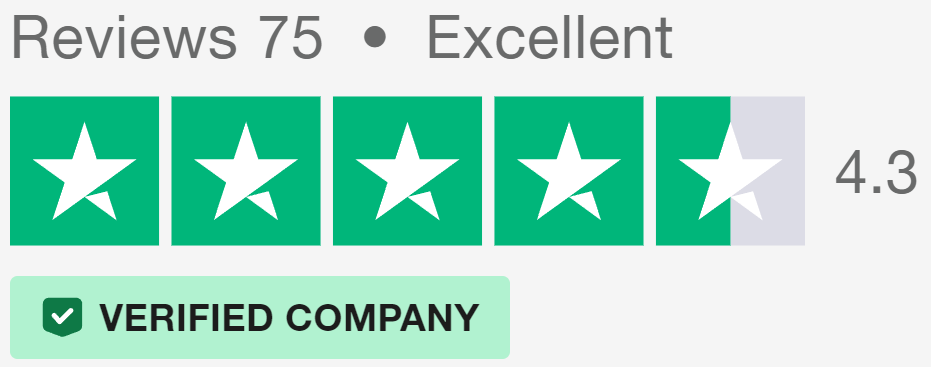
Introduction
When it comes to sprucing up your home, doors play a big part – they’re not just there to look pretty, but they also have a real impact on how your space looks and feels. And let’s face it, with so many options out there, it can be a bit of a head-scratcher trying to decide which one to go for. Two popular choices that always seem to be in the running are bifold doors vs sliding doors. But how do you know which one’s the best fit for you?
What Are Bifold Doors?
First up, let’s talk about bifold doors (also known as folding doors or bi-fold doors). These doors are made up of panels that fold back on themselves, a bit like an accordion. They come in all sorts of materials, like wood, aluminium, or uPVC, and you can use them both inside and outside your home. Bifold doors are a popular choice for small rooms, and bifold patio doors are great for opening up your space to the garden.
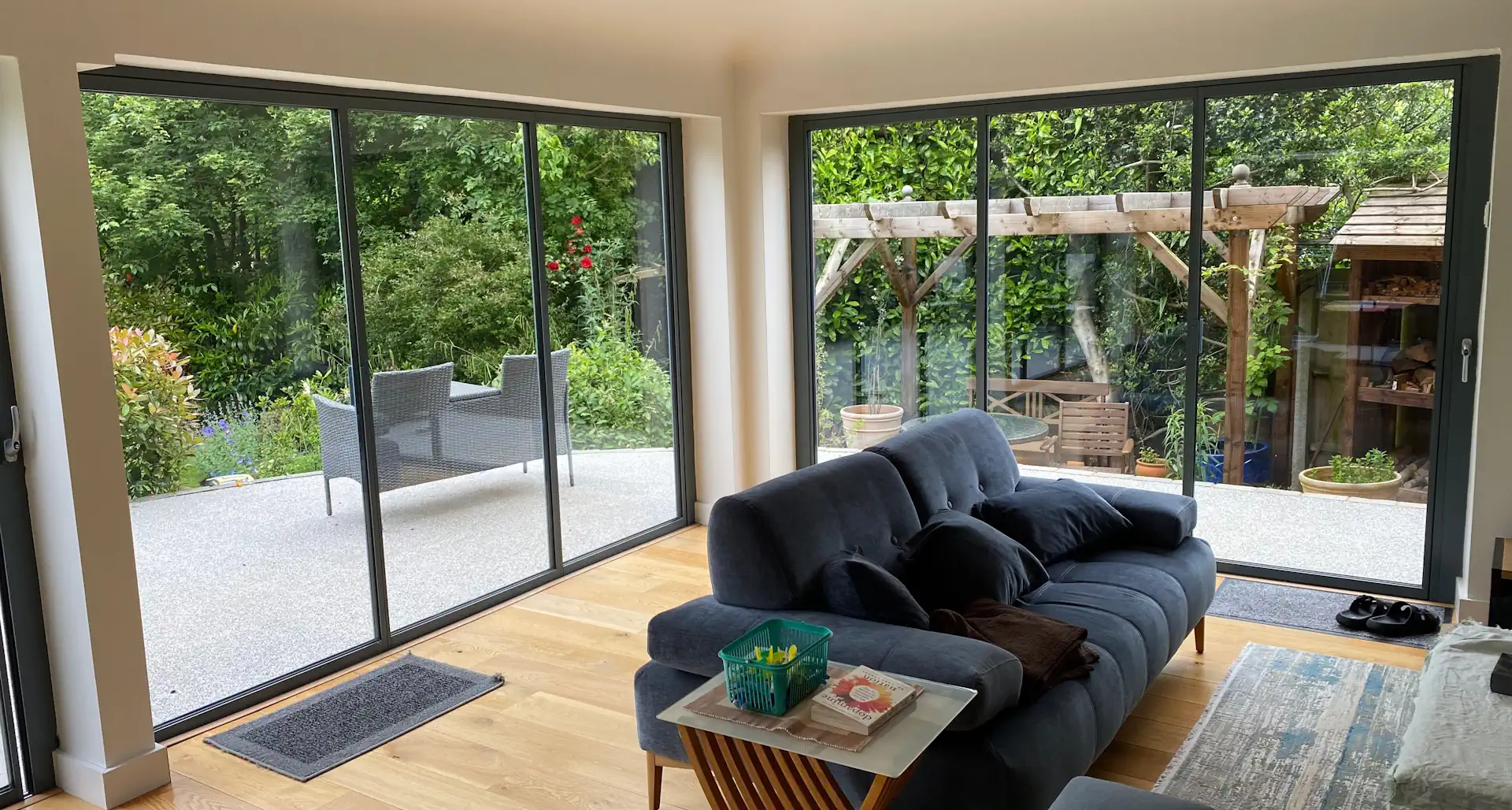
Bifold Doors: Benefits
One of the biggest selling points of bifold doors is that they’re great space-savers. When you open them up, they fold neatly to one side, giving you a wide, clear opening. This makes them a brilliant alternative to traditional swing doors, especially if you’re a bit tight on space.
Another great thing about bifold doors is that they’re really versatile when it comes to style. Whether you’re into a modern look or prefer something more traditional, you can tweak them to fit your vibe. Frameless bifold doors, for example, have a really sleek, contemporary feel that’s perfect for modern homes.
And let’s not forget about flexibility – with bifold doors, you get to choose how much space you want to open up. You can have them partially or fully open, depending on your mood.
Bifold Doors: Downsides
Of course, nothing’s perfect, and bifold doors do have a few drawbacks. The tracks that the doors slide on can sometimes have a mind of their own, getting misaligned or blocked. To keep them running smoothly, you’ll need to stay on top of maintenance. Another thing to keep in mind is the cost. Bifold doors can be a bit pricier than other types of doors, especially at the start. And if you need a pro to install them, that’s going to bump up the overall cost even more. Lastly, while bifold doors are brilliant for creating wide openings, you do need to have enough space for the folded panels. So if you’re really tight on space, they might not be the best option.What Are Sliding Doors?
Now, let’s move on to sliding doors. These are a staple in modern home design, known for their sleek look and how easy they are to use. They’re made up of big glass panels that slide horizontally along tracks, creating a smooth connection between your inside and outside spaces. Sliding doors are usually made from materials like glass, aluminium, and wood, and they’re a popular choice as external outside sliding doors, letting in plenty of natural light.
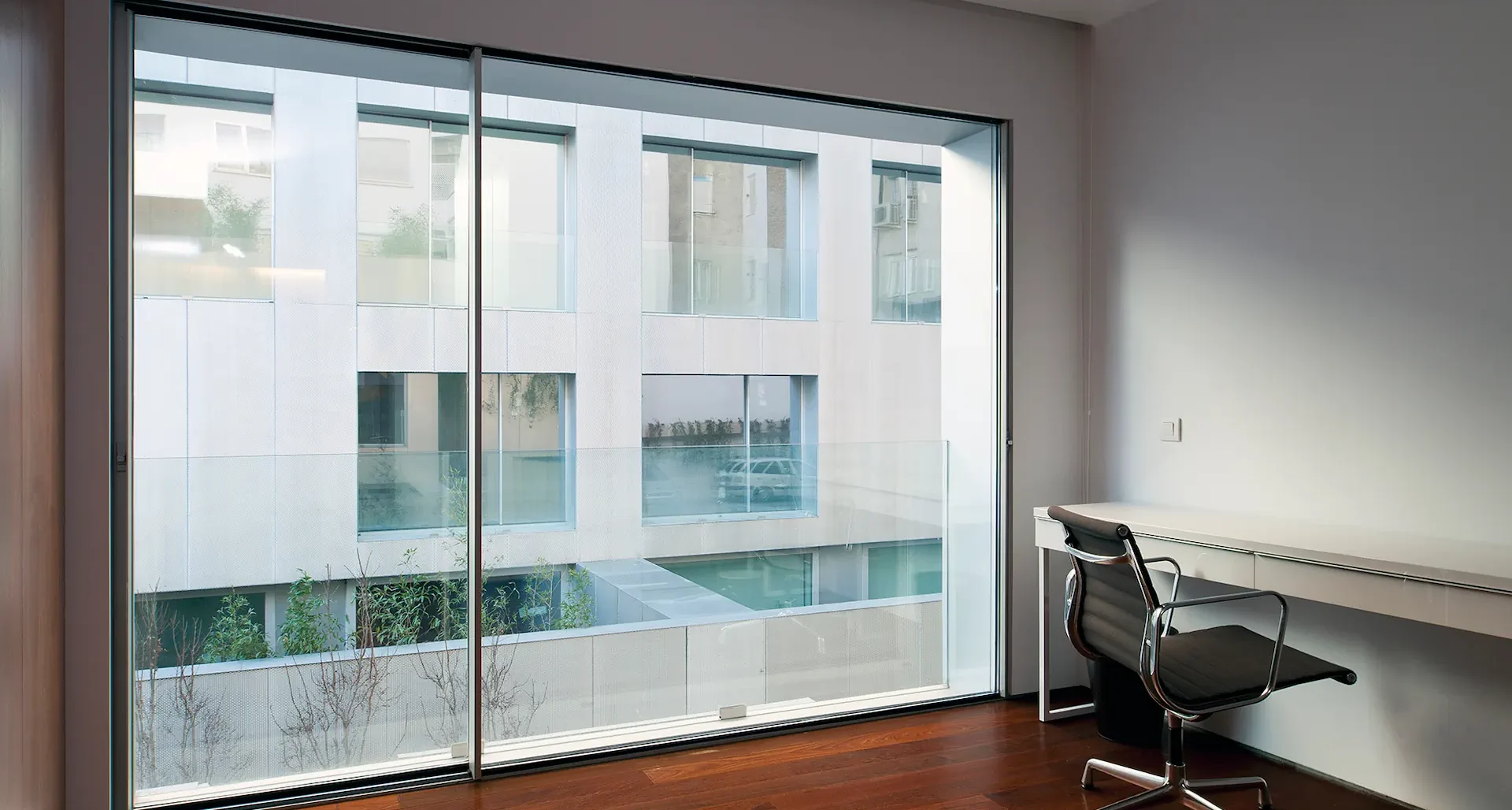
Sliding Doors: Benefits
One of the biggest draws of sliding doors is their sleek, modern look. They give you a great view and can make any room feel bigger and more open. Sliding patio doors are especially good at creating a strong visual link between your inside and outside spaces, which is perfect if you’ve got a garden or patio.
Using sliding doors is a piece of cake – they just glide along a track, so you don’t have to worry about making space for the door to swing open. This makes them ideal for smaller spaces, like city flats or compact rooms.
Plus, sliding doors are perfect for wide openings. If you’ve got a big wall space, sliding doors can create a really dramatic effect, letting in more light and giving you an uninterrupted view of the outside.
Sliding Doors: Downsides
But sliding doors aren’t without their flaws. One big limitation is that they only open up to half their width, because one panel slides behind the other. This can restrict airflow and movement compared to bifold doors. Maintenance can be another issue. The tracks that the doors slide on can get clogged up with dirt and debris, which can lead to blockages and means you’ll need to clean them regularly to keep things running smoothly. Cost is another factor to think about. Sliding doors, especially high-quality ones with fancy features, can be pretty pricey. And if you need a pro to install them, that’s going to add even more to the overall cost. Lastly, while sliding doors look great, they don’t give you as much flexibility when it comes to opening them. You can only slide them open or closed, unlike bifold doors, which let you open them partially.Bifold vs Sliding Doors: How Do They Stack Up?
Look and Feel
When you’re choosing between bifold doors vs sliding doors, the way they look and feel is a big factor. Bifold doors can be tweaked to fit both traditional and modern homes. Frameless bifold doors, for example, have a really sleek, minimalist look that’s perfect for contemporary interiors. On the other hand, sliding doors are often picked for their clean lines and big glass panels, which give a modern, uncluttered feel. Another key point is how much you can customise the design. Bifold doors can be set up in different ways to suit your needs, whether you want more panels for a bigger opening or fewer panels for a simpler look. Sliding doors, while less flexible in how they’re set up, can be designed with ultra-slim frames to maximise the glass area and make the space feel even more open.Space and How They Work
How each type of door works with your space is another important thing to think about. Bifold doors are great for creating wide, open spaces. They can open all the way, making them ideal for connecting inside and outside areas, like living rooms and gardens. This makes them a popular choice for people who want to make the most of their space and let in lots of light.
Sliding doors, on the other hand, don’t need any extra space to open and close, because they slide along a track. This makes them perfect for tight spaces where a traditional door swing would be a bit of a squeeze. But because sliding doors only open up to half their width, they can’t give you the same full opening as bifold doors.
Bifold vs Sliding Doors Costs
Money is always a big factor in home improvement projects. At the start, bifold doors can cost more than sliding doors, especially if you go for fancy materials like aluminium or custom designs. Plus, the cost of installation and any potential repairs can bump up the overall price. Sliding doors can also be pricey, but you might save a bit on installation costs. But the sliding door vs bifold door cost can vary a lot depending on the specific features and materials you choose. When you’re weighing up the cost of bifold doors vs sliding doors, it’s important to think about long-term value and how long they’ll last.Bifold vs Sliding Doors: Installation and Maintenance
When you’re deciding between bifold and sliding doors, it’s worth thinking about how they’re installed and maintained. Bifold doors can be a bit trickier to install because they have more panels and folding parts. This might mean higher labour costs and more time. Once they’re in, bifold doors need regular maintenance. Sliding doors are generally easier to install, with fewer moving parts. Maintenance involves keeping the tracks clean and making sure the rollers are in good condition. Both types of doors will last longer and work better if they’re installed by a professional.Bifold vs Sliding Doors FAQs
Which is better for small spaces, bifold doors or sliding doors?
Sliding doors are often the better choice for small spaces. They don’t need any extra space to open and close, making them perfect for compact areas. Bifold doors, while space-saving when open, do need a bit of room for the panels to fold.
Are bifold doors more expensive than sliding doors?
The cost of bifold doors vs sliding doors can vary a lot based on materials, size, and how tricky they are to install. Generally, bifold doors might be more expensive because of their fancy design and folding mechanism. But sliding doors can also be pricey, especially if you go for high-quality materials and big glass panels. It’s important to think about both the upfront costs and long-term maintenance.
Can bifold and sliding doors be customised to fit my home's style?
Absolutely. Both bifold and sliding doors come in loads of styles, materials, and finishes. Frameless bifold doors and ultra-slim sliding doors have a sleek, modern look. And if you prefer a classic feel, you can get traditional wood finishes. With customisation options, you can match your doors to your home’s overall vibe.
How do maintenance requirements compare between bifold and sliding doors?
Maintenance for both types of doors involves keeping the tracks clean and making sure the mechanisms are running smoothly. Bifold doors might need more frequent checks because they have more hinges and folding tracks. Sliding doors mainly need track and roller maintenance.
For security, is there a difference with bifold vs sliding doors?
Both bifold and sliding doors can be fitted with sturdy locks to keep your home secure. Modern bifold doors often have multi-point locking systems. Sliding doors can be just as secure with advanced locks and toughened glass. The key is to choose high-quality doors with security features that meet your needs.
Are there energy-efficient options available for both bifold and sliding doors?
Definitely. Both bifold and sliding doors can be designed with energy efficiency in mind. Look for doors with double or triple glazing, thermal breaks, and weather seals. These features help to keep the heat in and improve insulation, making your home more energy-efficient.
Can bifold and sliding doors be used for internal spaces?
Absolutely. Internal bifold doors are popular for creating flexible spaces within the home, like between living areas and dining rooms. Sliding doors are also used inside, especially for wardrobes or to divide rooms without taking up extra space.
How do I decide between bifold vs sliding doors for my patio?
When deciding between bifold vs sliding doors for your patio, think about how you want to use the space. If you want a wide, open connection to your garden, bifold patio doors are ideal. They let the whole wall open up, perfect for entertaining or enjoying an indoor-outdoor living experience. Sliding patio doors, on the other hand, have a more streamlined look and are great for making the most of the view with big glass panels. Weigh up your priorities when it comes to space, view, and how easy they are to use.
Making the Right Choice for Your Home
Deciding on bifold vs sliding doors comes down to understanding what you need and what you like. Both types of doors have their own pros and cons, making them better for different situations.
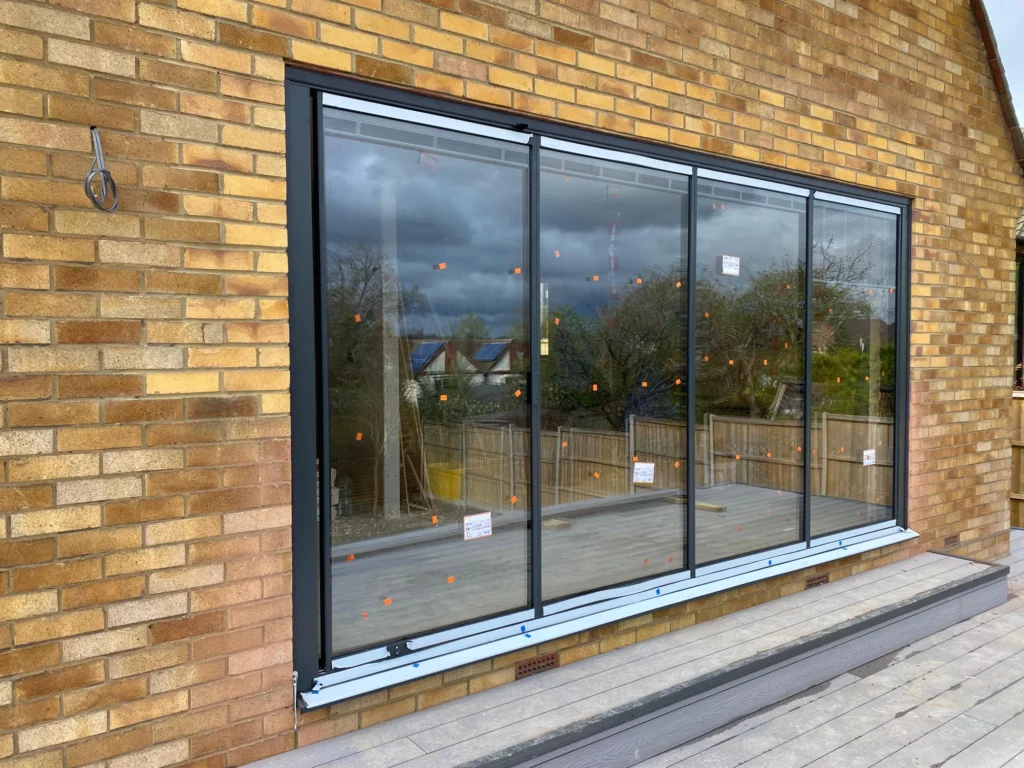
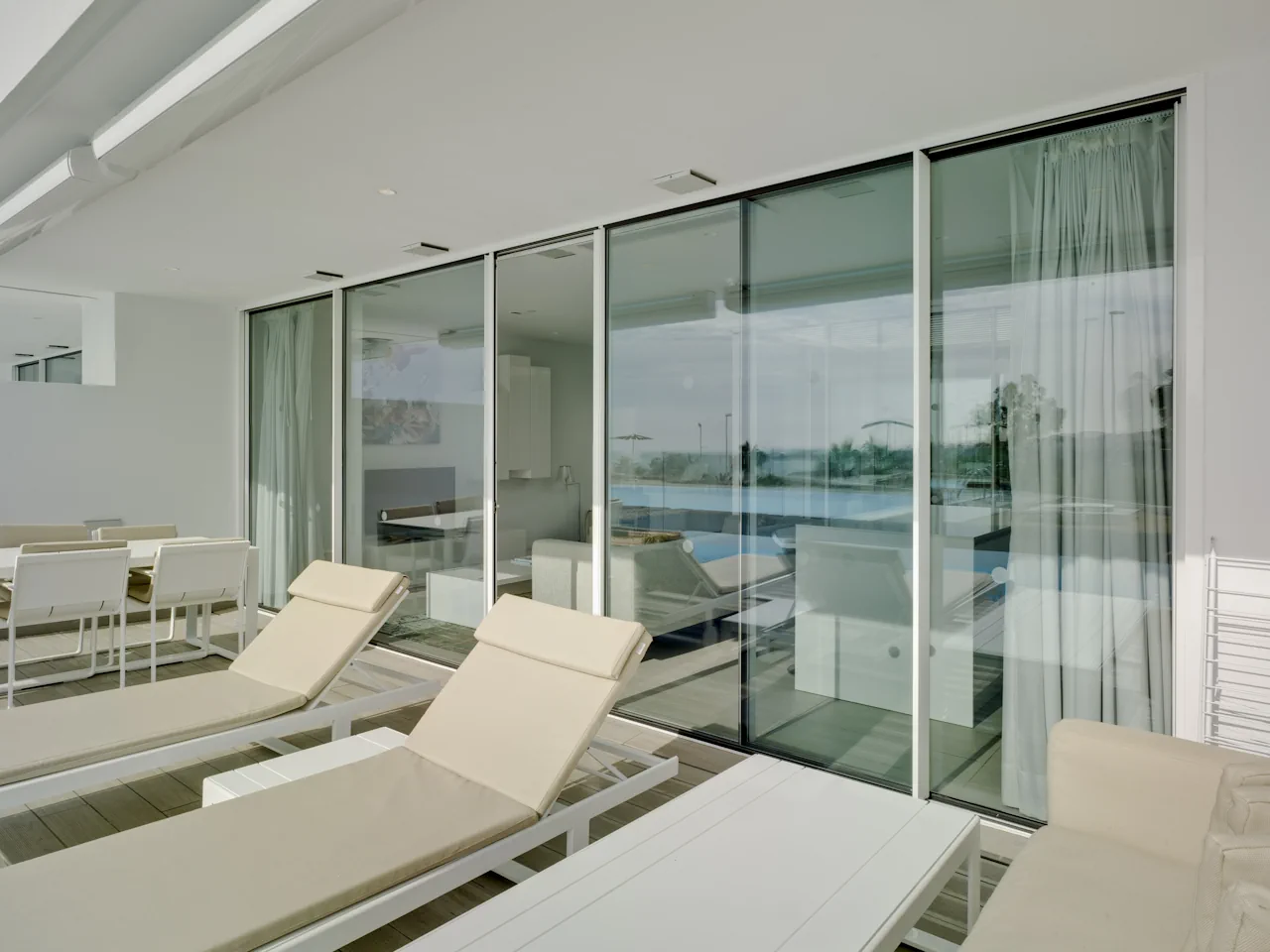
Bifold vs Sliding Doors – Need Help Deciding?
Our doors have gone through rigorous security testing and successfully passed PAS-24 certification, now a requirement by law for all new-build homes.
We design, manufacture, and build to measure our systems at our facility in Luton, Bedfordshire. We offer installation within a 100-mile radius.
Our leading range of door systems include Ultra Slim – Slide and Turn Doors, Slimline Sliding Patio Doors and Frameless Glass Doors. Suitable for various internal and external applications, they are applicable to residential and commercial projects.
Please contact us for a quotation or further information.
Click Quick Quote Online for a free quotation within 24 hours. Alternatively, call or email us on 01582 492730 or at info@visionglassdoors.co.uk.

